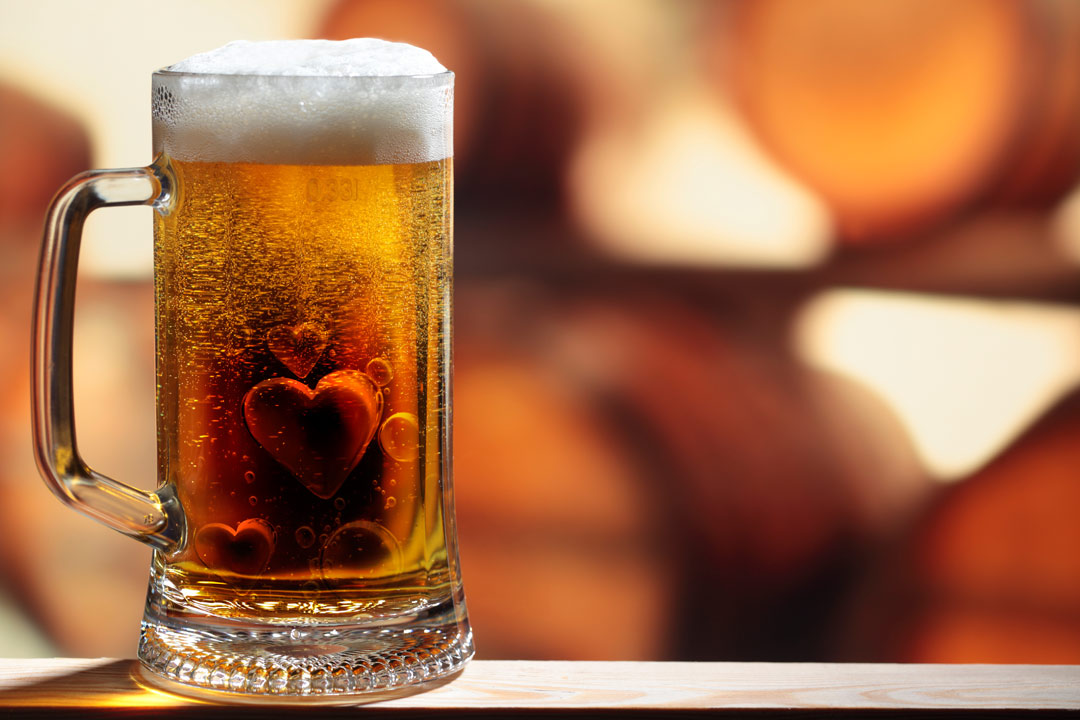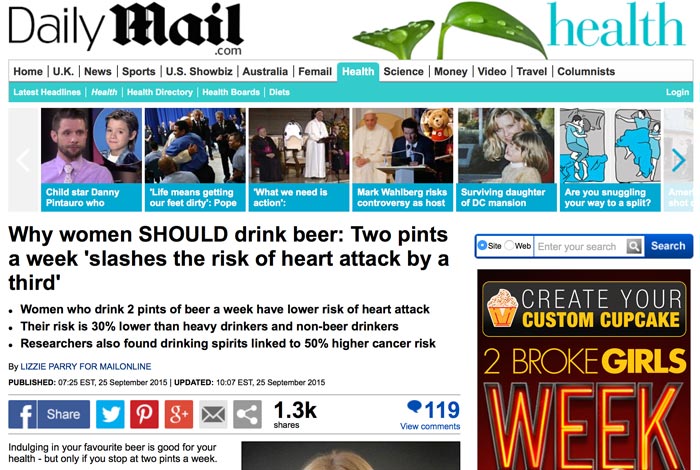Should women drink beer to prevent heart attacks?

A new Swedish study found some benefits for women in moderate drinking, and some health consequences of heavy drinking—as many studies before have indicated. Yet the Daily Mail seems to have read an entirely different study on alcohol, resulting in a headline encouraging the consumption of beer: “Why women SHOULD drink beer: Two pints a week ‘slashes the risk of heart attack by a third.’” For good measure, the “bad news” was accompanied by the warning that “Researchers also found drinking spirits linked to 50% higher cancer risk.”
The actual study (and its commentaries on other research in the field) provides a far more nuanced picture. The study resulted from data collected over a 32-year period on 1,462 women aged between 38 and 60 years of age in 1968-1969. As these women aged, they reported their drinking habits and were assessed for major health markers, like having had a heart attack or a stroke, or receiving a diagnosis of cancer. If they died before the end of the study, the cause of their deaths was also recorded.
The resulting data provide fertile ground for many comparisons; the study published in the Scandinavian Journal of Primary Health Care took a look at how women who drink compare to those who do not on a number of measures: having a heart attack, having a stroke, or getting cancer were three end-points for illness, and then dying of any of these three causes were an additional three end points. The scientists then compared how women who drink each kind of alcohol (wine, beer or spirits) with those who do not drink those products.
The headline unabashedly declares that women can reduce their risk of heart attack by drinking beer. Sure enough, the study found that women who drank moderate amounts of beer were at a reduced risk of getting heart attacks, with an adjusted hazard ratio of 0.70 (95 percent confidence interval 0.50-0.97). The hazard ratio is the ratio of the probabilities of having a heart attack in a specified length of time among women who drink beer, compared to those who don’t. At 0.70, the probability of a beer drinker having a heart attack over a period of time is 70 percent of the probability for someone who does not drink beer. This indicates a correlation of good things in life: drinking beer, and avoiding heart attacks.
Yet the causal conclusion is unwarranted. There are so many lifestyle components that correlate with drinking—and some of them may be correlated with the benefits associated with drinking beer. These might include having a more active social life, eating less unhealthy foods, or obtaining more appropriate medical care. Unknown confounders may influence the outcome. That is why a relatively small observational study like this one can never, by itself, be convincing that an observed correlation reflects a causal benefit of beer.
The media coverage also selected favorite correlations to report, while ignoring others. While the Daily Mail noted the health benefits of beer in terms of having heart attacks, the death rates from various kinds of alcohol tell an even better story: deaths due to heart attacks were reduced for those who drank beer and for those who drank spirits, and deaths due to stroke were reduced for those who drink wine. Deaths due to cancer were increased for those who drank spirits, but deaths due to diabetes were reduced for the same group.
Arguably the overall death rates are more important than the rates of any individual cause of death: spirits did not have a statistically significant correlation with dying prematurely among those drinking spirits. The overall death rates among beer drinkers was lower than for non-beer drinkers in one model—but not after controlling for the confounders of socio-economic status, education, lifestyle choices (smoking, physical activity, diet, BMI) and lab measurements like blood pressure, triglycerides, and cholesterol.
So where does that leave us? With a lot of caution about the results of this single study. As the authors noted in their conclusion, “it is premature to recommend that women should drink beer regularly.” Yet the Daily Mail did exactly that, without looking at carefully at conclusions that, according to the very research the news source was citing, were unsubstantiated.
Image composited from istockphoto.



Trackbacks/Pingbacks